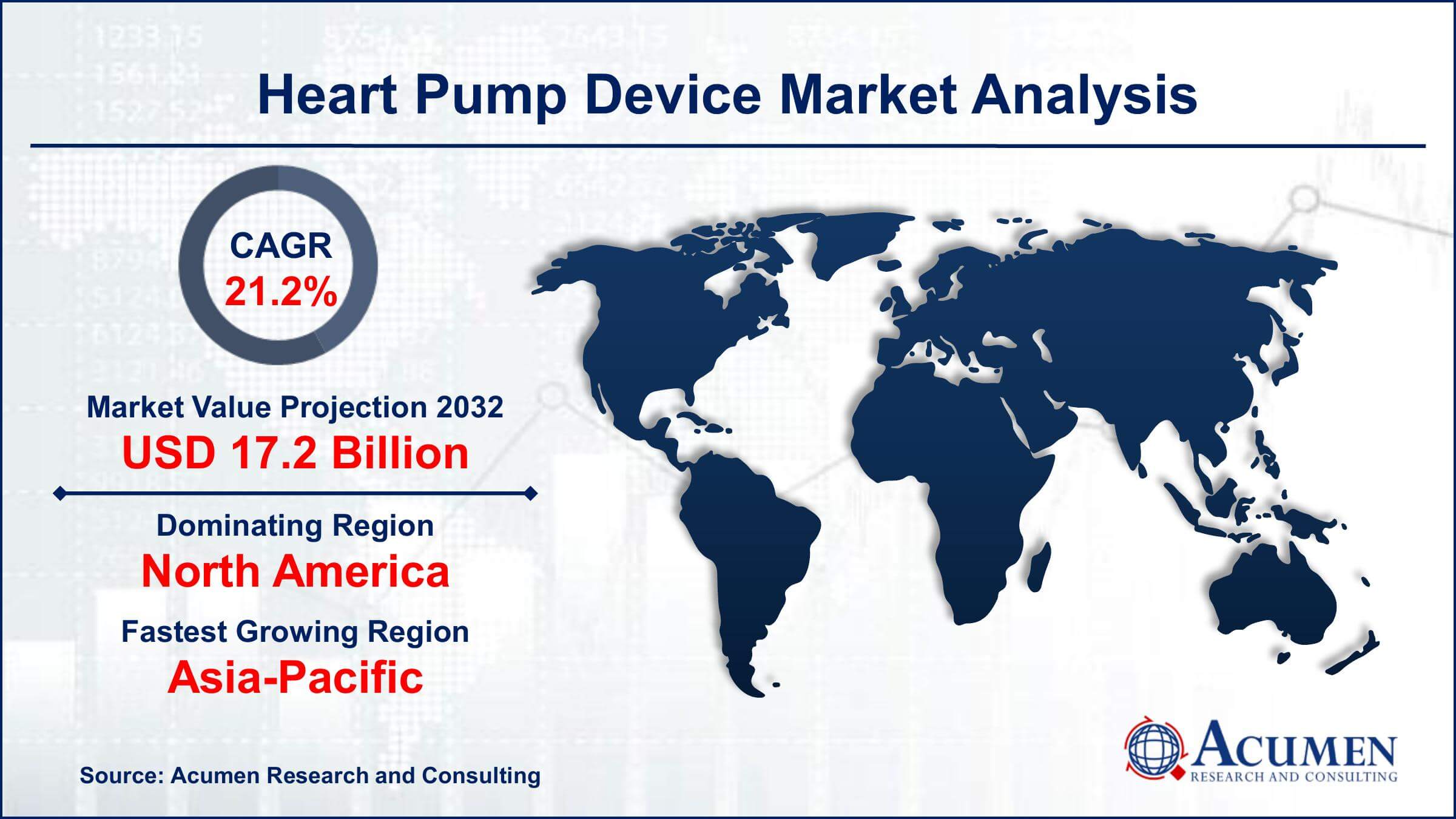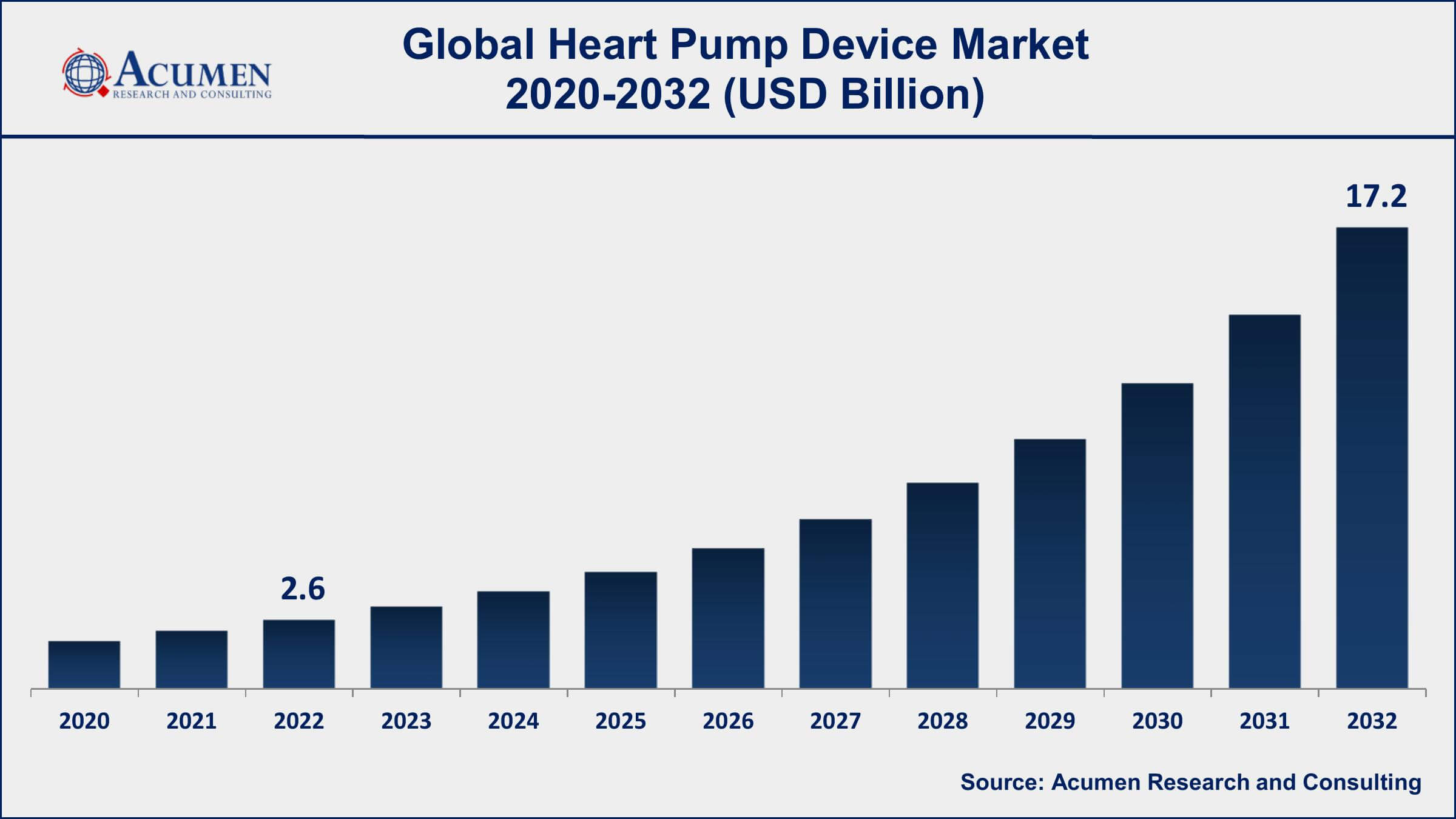Heart Pump Device Market Size - Global Industry, Share, Analysis, Trends and Forecast 2023 - 2032
Select Access Type
The Global Heart Pump Device Market Size accounted for USD 2.6 Billion in 2022 and is projected to achieve a market size of USD 17.2 Billion by 2032 growing at a CAGR of 21.2% from 2023 to 2032.
Heart Pump Device Market Highlights
- Global Heart Pump Device Market revenue is expected to increase by USD 17.2 Billion by 2032, with a 21.2% CAGR from 2023 to 2032
- North America region led with more than 34% of the Heart Pump Device Market share in 2022
- Asia-Pacific Heart Pump Device Market growth will record a CAGR of around 22% from 2023 to 2032
- According to the Organ Procurement and Transplantation Network (OPTN) data, as of 2020, over 26,000 heart pump devices had been implanted in the United States
- According to the INTERMACS database, one-year survival rates for patients with LVADs have reached approximately 80-85%
- Increasing prevalence of heart failure worldwide, drives the Heart Pump Device Market value

A heart pump device, also known as a ventricular assist device (VAD), is a mechanical device designed to support or replace the function of a weakened or failing heart. It is primarily used in patients with advanced heart failure, where the heart is unable to pump blood adequately to meet the body's demands. The heart pump device helps to increase blood flow and improve the overall circulation, thereby enhancing the patient's quality of life and potentially extending their lifespan. These devices can be temporary or permanent, depending on the patient's condition and treatment goals.
The heart pump device market has experienced significant growth in recent years. Factors contributing to this growth include the rising prevalence of heart failure worldwide, advancements in technology, and increasing awareness about heart failure treatment options. Additionally, improvements in the design and functionality of heart pump devices have made them more effective and reliable, leading to increased adoption by healthcare professionals. The market has also been driven by the growing number of heart transplant candidates who are not eligible for a transplant or are awaiting a suitable donor organ. Heart pump devices provide a viable alternative for these patients, bridging the gap until a transplant becomes available.

Global Heart Pump Device Market Trends
Market Drivers
- Increasing prevalence of heart failure worldwide
- Growing awareness about heart failure treatment options
- Rising number of heart transplant candidates
- Improved reliability and efficacy of heart pump devices
- The aging population and the associated increase in cardiovascular diseases
Market Restraints
- High cost associated with heart pump devices and their implantation
- Limited availability of donor organs for heart transplantation
- Potential complications and risks associated with device implantation and long-term use
Market Opportunities
- Development of smaller, more durable, and efficient heart pump devices
- Increasing focus on personalized medicine and customized treatment approaches
Heart Pump Device Market Report Coverage
| Market | Heart Pump Device Market |
| Heart Pump Device Market Size 2022 | USD 2.6 Billion |
| Heart Pump Device Market Forecast 2032 | USD 17.2 Billion |
| Heart Pump Device Market CAGR During 2023 - 2032 | 21.2% |
| Heart Pump Device Market Analysis Period | 2020 - 2032 |
| Heart Pump Device Market Base Year | 2022 |
| Heart Pump Device Market Forecast Data | 2023 - 2032 |
| Segments Covered | By Product, By Type, By Therapy, And By Geography |
| Regional Scope | North America, Europe, Asia Pacific, Latin America, and Middle East & Africa |
| Key Companies Profiled | Medtronic plc, Abbott Laboratories, Boston Scientific Corporation, Berlin Heart GmbH, SynCardia Systems, LLC, Abiomed, Inc., LivaNova PLC, Getinge AB, Jarvik Heart, Inc., Terumo Corporation, ReliantHeart Inc., and CardiacAssist, Inc. (TandemLife) |
| Report Coverage |
Market Trends, Drivers, Restraints, Competitive Analysis, Player Profiling, Covid-19 Analysis, Regulation Analysis |
A heart pump device, also known as a ventricular assist device (VAD), is a mechanical device designed to assist or replace the function of a weakened or failing heart. It is used primarily in patients with advanced heart failure, a condition in which the heart is unable to pump blood adequately to meet the body's needs. The heart pump device helps to increase blood flow and circulation by either assisting the heart's pumping action or taking over its function entirely. It is typically implanted surgically, and it can be temporary or permanent, depending on the patient's condition and treatment goals.
The application of heart pump devices is primarily focused on patients with advanced heart failure who are not responding well to medical therapy or are ineligible for heart transplantation. These devices serve as a bridge to transplant, providing support until a suitable donor heart becomes available. They can also be used as destination therapy, which means they serve as a long-term treatment option for patients who are not candidates for heart transplantation. In addition, heart pump devices can be used as a bridge to recovery, supporting the heart during a period of acute illness or post-surgery until the heart regains its function.
The heart pump device market has experienced robust growth in recent years and is expected to continue expanding in the coming years. Several factors contribute to this growth. Firstly, the rising prevalence of heart failure globally is a significant driver. With an increasing aging population and the growing burden of cardiovascular diseases, the demand for heart pump devices as a treatment option for advanced heart failure is on the rise. Secondly, technological advancements in heart pump devices have significantly contributed to market growth.
Heart Pump Device Market Segmentation
The global Heart Pump Device Market segmentation is based on product, type, therapy, and geography.
Heart Pump Device Market By Product
- Ventricular Assist Devices (VADs)
- Total Artificial Heart (TAH)
- Intra-Aortic Balloon Pumps (IABPs)
According to the heart pump device industry analysis, the ventricular assist devices (VADs) segment accounted for the largest market share in 2022. VADs are mechanical devices that assist or replace the function of the ventricles, the main pumping chambers of the heart. They are primarily used in patients with end-stage heart failure as a bridge-to-transplant or destination therapy. One of the key drivers of growth in the VAD segment is the increasing prevalence of heart failure. As the incidence of heart failure continues to rise, the demand for effective treatment options such as VADs has grown substantially. VADs provide mechanical support to the failing heart, improving blood flow and alleviating symptoms, thereby enhancing the quality of life for patients with advanced heart failure. Moreover, advancements in VAD technology have played a crucial role in driving market growth.
Heart Pump Device Market By Type
- Extracorporeal Heart Pump Devices
- Implantable Heart Pump Devices
In terms of types, the implantable heart pump devices segment is expected to witness significant growth in the coming years. These devices, also known as implantable ventricular assist devices (IVADs), are surgically implanted inside the body to provide mechanical support to the failing heart. They offer long-term assistance and are designed for patients with advanced heart failure who are not eligible for heart transplantation. One of the key factors driving the growth of the implantable heart pump devices segment is the increasing prevalence of heart failure. As the incidence of heart failure continues to rise globally, there is a growing need for advanced treatment options that can provide long-term support. Implantable heart pump devices fulfill this need by offering durable and continuous mechanical assistance to the failing heart, thereby improving patient outcomes and quality of life.
Heart Pump Device Market By Therapy
- Bridge-To-Transplant (BTT)
- Destination Therapy (DT)
- Bridge-To-Candidancy (BTC)
- Other Therapies
According to the heart pump device market forecast, the bridge-to-transplant (BTT) segment is expected to witness significant growth in the coming years. Bridge-to-Transplant refers to the temporary use of heart pump devices in patients with end-stage heart failure who are awaiting a heart transplant. These devices provide mechanical support to the failing heart until a suitable donor heart becomes available for transplantation. One of the primary drivers of growth in the BTT segment is the increasing number of patients with end-stage heart failure who are on the waiting list for heart transplantation. The shortage of donor organs and the limited availability of suitable donor hearts have led to a growing need for temporary mechanical support options. BTT devices offer a lifeline to these patients by providing them with the vital support they need while they await a transplant. This has led to an increased demand for BTT devices as a bridge therapy, driving market growth in this segment.
Heart Pump Device Market Regional Outlook
North America
- U.S.
- Canada
Europe
- U.K.
- Germany
- France
- Spain
- Rest of Europe
Asia-Pacific
- India
- Japan
- China
- Australia
- South Korea
- Rest of Asia-Pacific
Latin America
- Brazil
- Mexico
- Rest of Latin America
The Middle East & Africa
- South Africa
- GCC Countries
- Rest of the Middle East & Africa (ME&A)
Heart Pump Device Market Regional Analysis
Geographically, North America dominates the heart pump device market in 2022. The North America region has a well-established healthcare infrastructure and advanced medical technology ecosystem. The presence of leading medical device manufacturers, research institutions, and healthcare facilities allows for the rapid development and adoption of heart pump devices. North America has a strong history of medical innovation and is at the forefront of advancements in cardiac care, contributing to its dominance in the market. Moreover, the high prevalence of cardiovascular diseases, including heart failure, in North America drives the demand for heart pump devices. Factors such as sedentary lifestyles, unhealthy diets, and an aging population contribute to the increasing burden of heart failure in the region. Consequently, there is a greater need for advanced treatment options, including heart pump devices, to address the growing patient population. The awareness and availability of these devices in North America make it a lucrative market for manufacturers and suppliers.
Heart Pump Device Market Player
Some of the top heart pump device market companies offered in the professional report include Medtronic plc, Abbott Laboratories, Boston Scientific Corporation, Berlin Heart GmbH, SynCardia Systems, LLC, Abiomed, Inc., LivaNova PLC, Getinge AB, Jarvik Heart, Inc., Terumo Corporation, ReliantHeart Inc., and CardiacAssist, Inc. (TandemLife).
